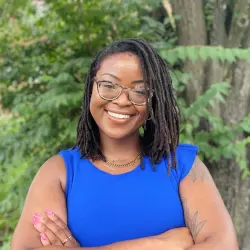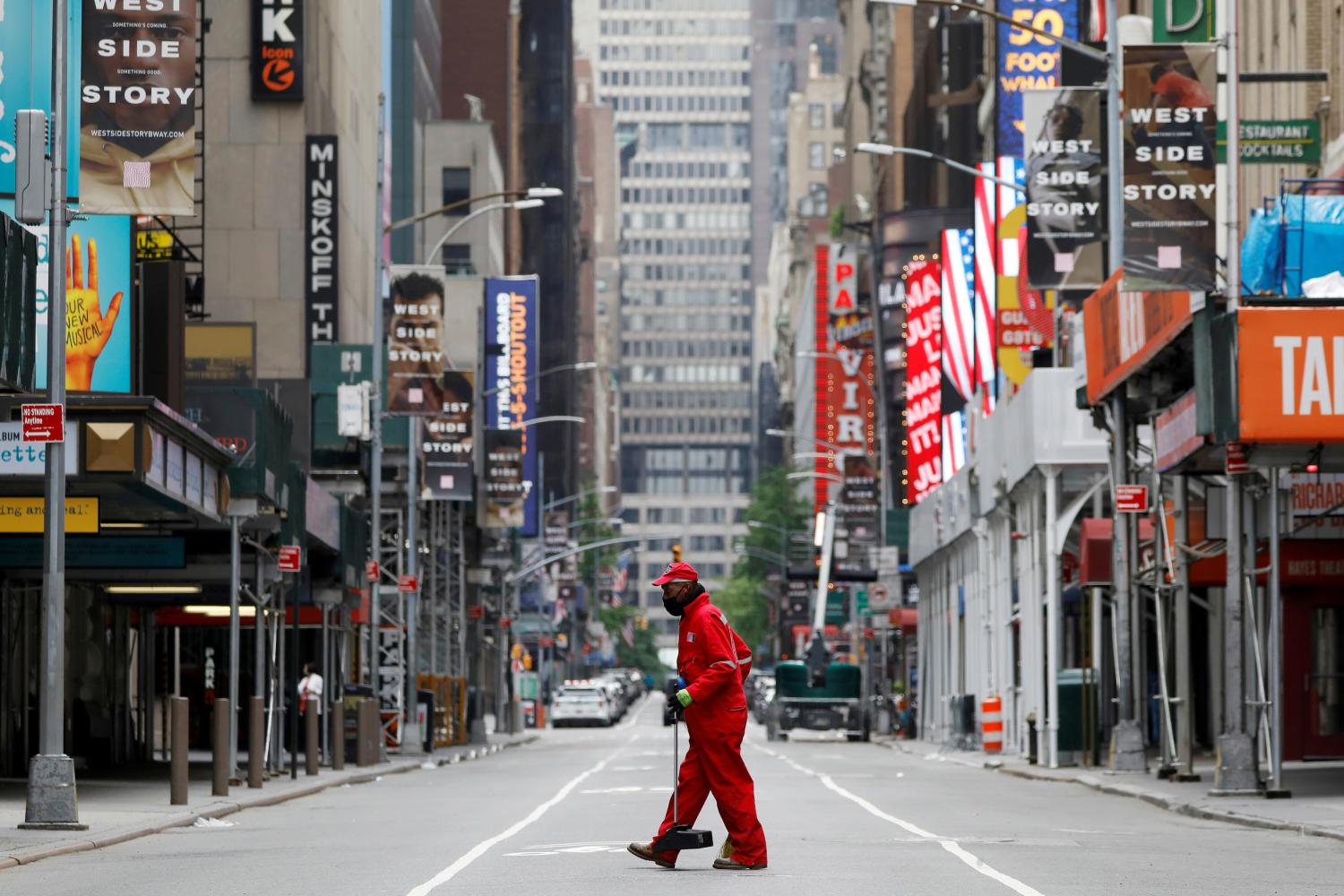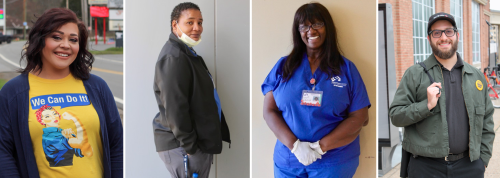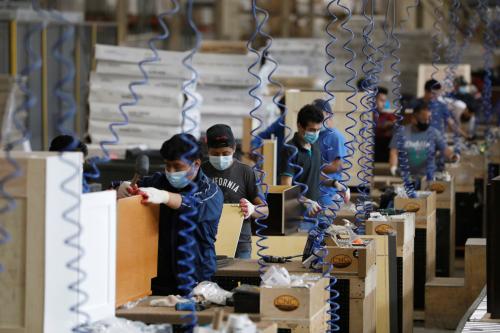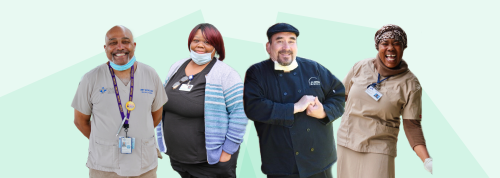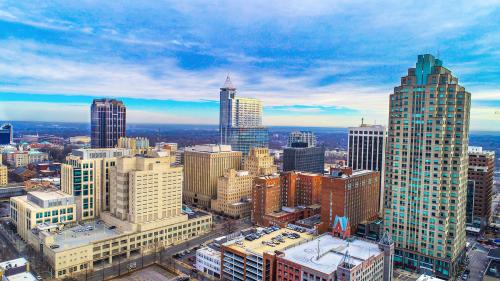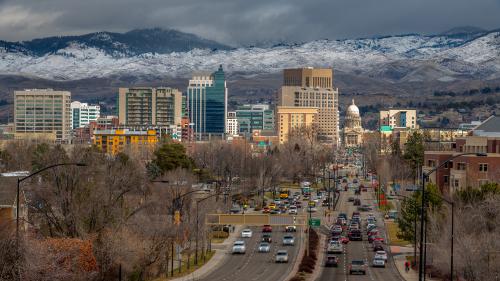“I can’t breathe.” These were some of George Floyd’s final, devastating words—a phrase that speaks to the anguish, anger, and fear felt by many Black Americans, who are dying in stunningly unequal rates from two crises gripping the nation. The first: deeply ingrained structural racism. The second: a pandemic with Black death rates up to 10 times higher than white rates.
In the middle of these twin crises are the roughly 12 million Black essential workers who—like EMT Breonna Taylor before she was killed in her home by police—are putting their lives on the line during the pandemic. For months, employers and policymakers have celebrated essential workers with praise, applause, and TV ads declaring them as heroes. Now, many of these same companies and politicians are voicing their support for the Black Lives Matter movement, posting internet banners, making philanthropic donations, and taking a knee.
However, while these policymakers and companies are saying Black lives matter and essential workers are heroes, their actions—from inadequate safety protections and enforcement to ending temporary pay increases and failing to enact federal hazard pay—speak even louder.
Black essential workers need more than soundbites. To show that Black workers are essential, not expendable, employers and policymakers need to show, not tell.
Black workers are more likely to be essential—and more likely to die
From bus drivers to security guards to hospital orderlies, Black workers are overrepresented among COVID-19’s frontline essential workers (defined as essential workers who must physically report to jobs sites where they face elevated risks of infection). They are especially overrepresented in jobs that put workers’ and their families’ lives at risk without even a family-sustaining living wage. Black workers occupy 13% of all jobs across the economy, but they make up approximately 19% of essential jobs that pay less than $16.54 an hour, the wage necessary to meet the basic needs of a family of four.

Millions of Black essential workers are working in roles such as nursing assistants and home health aides, caring for society’s most vulnerable during the pandemic. These essential but undervalued jobs—held by a disproportionate number of Black workers, especially Black women—often pay poverty wages and offer few, if any, benefits such as paid leave or health insurance.
Black workers comprise many of those in common low-wage frontline essential occupations
Five largest low-wage frontline essential occupations, United States, 2018
| Occupation | Total number of workers | % of workers who are Black | Mean hourly wage |
| Personal Care Aides | 2,152,540 | 23.2% | $12.06 |
| Cashiers | 1,959,950 | 17.0% | $11.17 |
| Janitors and Cleaners, except Maids and Housekeeping Cleaners | 1,774,500 | 16.9% | $13.92 |
| Laborers and Freight, Stock, and Material Movers, Hand | 1,471,370 | 21.7% | $14.85 |
| Nursing Assistants | 1,389,520 | 35.3% | $14.22 |
| All U.S. workers | 144,731,220 | 13.0% | $24.98 |
Source: Brookings analysis of Department of Homeland Security, Bureau of Labor Statistics and Emsi data.
Black essential workers shoulder more of the burden and risks of work that is critical to keeping the country functioning during the pandemic. Several recent surveys found that Black (and also Latino or Hispanic) workers were far more concerned than white workers about the risks they faced from exposure to the virus at work, and significantly more fearful of infecting their families. In interviews, several Black essential workers used words such as “petrified” and “scared” to describe how they felt in their roles cleaning hospital rooms and caring for vulnerable patients.
These fears are well-founded. While the U.S. government does not systematically report COVID-19 deaths by occupation (although it should), many of the worst outbreaks and deaths have occurred in occupations that employ a disproportionate number of Black workers. These include jobs in public transit, the meatpacking industry, and nursing homes and long-term care facilities.
Prioritizing the health and economic security of Black essential workers
If Black lives truly matter, policymakers and employers must do far more to protect Black essential workers and the millions more soon returning to job sites. As recently as last month, three-quarters of surveyed frontline health workers reported insufficient access to lifesaving personal protective equipment (PPE). And the University of California, Berkeley found highly uneven and often inadequate safety standards and precautions across workplaces that employ frontline workers.
The federal government has failed to hold employers accountable for the safety of their workers during the COVID-19 pandemic. The Occupational Safety and Health Administration (OSHA) has been appallingly slow to enact enforceable safety standards; despite receiving thousands of complaints from workers during the pandemic, OSHA has issued only one citation for a safety violation. Protecting the lives of Black workers requires companies to prioritize worker safety, and the federal government to provide enforcement, oversight, and equipment.
But valuing Black lives also means providing economic security, dignity, and opportunities. There is no racial justice unless workers also have economic justice. For millions of Black workers, pay and benefits weren’t enough even before the pandemic. Now, Black workers face persistent and stark wage gaps compared to white workers and are less likely to have access to benefits such as paid sick leave, health insurance, and the ability to work from home. Far too many Black workers are in unstable jobs with few advancement opportunities and too many instances of disrespect.
In the short run, the federal government should enact hazard pay for all essential workers and companies should extend pandemic-related pay increases. While a few dozen large employers in the grocery, retail, pharmacy, and warehousing industries offered their essential workers temporary pay increases or smaller bonuses at the start of the pandemic, most of these employers—including Kroger, Amazon, Lowe’s, Costco, and Dollar Tree—are letting the increases expire, even as workers face ongoing health hazards.
The rollback of temporary pay increases for essential workers devalues Black lives in particular. Walmart and Amazon—the first- and second-largest private employers in the country—employ well above-average shares of Black workers (21% and 27%, respectively, compared to 13% nationally). Both companies are ending temporary pay increases, even as their workers risk their lives while sales and stock market value continue to rise. These companies have publicly committed to racial justice, but if they want to put their words into practice, they should extend pay increases while the COVID-19 threat continues—and, ultimately, make them permanent.
As communities begin to reopen from the pandemic, employers and leaders should do far more than return to “normal.” Employers must make an active and intentional shift from minimum wages to living wages for those whose work was essential long before the pandemic and will be long after. Encouragingly, Target recently announced it was raising starting pay to $15 an hour, the first major employer to permanently increase wages during the pandemic.
But we can’t leave it up to each and every employer to move their employees to living wages. Federal and state policymakers must ensure that the minimum wage is at least $15 an hour for all workers. And in addition to rethinking compensation, employers must also reflect on how their business models, hiring pipelines, screening processes, and management mindsets reproduce exclusionary behaviors in the labor market. Many of the same companies proclaiming a commitment to racial justice disproportionately exclude Black talent from positions that offer higher wages, full benefits, stable hours, career advancement, work-based learning, mentorship, peer networks, and leadership.
Protecting Black workers’ voice and rights
At the same time that Black workers are more likely to hold risky, frontline essential jobs, they also face discrimination and higher risks of retaliation when they speak out. Over the last several months, thousands of essential workers have participated in walkouts, protests, and petitions to voice their frustration over inadequate safety, pay, and benefits. But persistent racial discrimination in the workplace has meant that Black workers are not treated the same as white workers when they raise these concerns. New survey data from NELP found that Black workers are more than twice as likely as white workers to have seen possible retaliation from an employer against themselves or another employee for speaking up about pandemic-related concerns.
Policymakers at all levels of government should do more to protect the rights of workers who protest over safety concerns or refuse to work in unsafe conditions. These immediate efforts should go hand in hand with broader efforts to strengthen worker voice, their power, and their collective bargaining rights.
Do Black lives matter to our nation’s policymakers and the employers? Without concrete reform, don’t take them at their word. Instead, we must insist they demonstrate the value of Black lives through protecting workers’ safety, offering them the dignity of a living wage, benefits, and opportunity, and ensuring that their voices are heard and rights are secured. Anything short of that is just more soundbites.

